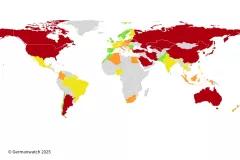In the past few months, we have seen a growing push, notably with the public statement of the SBTi Board of Trustees, to allow companies and countries to use carbon credits to offset their emissions. This reflects a bigger trend of bending carbon accounting rules, undermining actual emissions reductions.
Climate targets must focus primarily on reduction of greenhouse gas emissions within companies’ and countries’ own boundaries, including the phasing out of fossil fuel production, transport, sale and use. An urgent scale-up of financial support from both public and private actors is needed for this. But allowing companies and countries to meet climate commitments with carbon credits is likely to slow down global emission reductions while failing to provide anything like the scale of funds needed in the Global South, and reducing pressure to develop large-scale mechanisms such as “polluter pays” fees on emission-intensive sectors.
More than 80 leading civil society organisations, including NewClimate Institute, have issued a joint statement rejecting the use of carbon offsets to meet corporate climate targets. We call on accounting bodies like the Science-Based Targets Initiative (SBTi) and the Greenhouse Gas Protocol to continue excluding offsets and stick to scientifically-sound methodologies for tracking corporate climate efforts.





